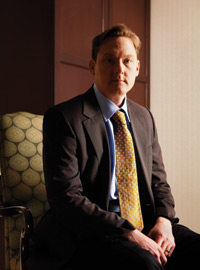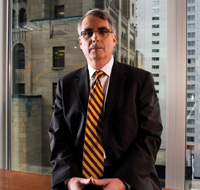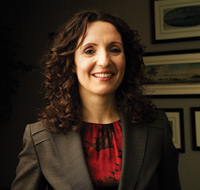 “Coffee…tea…snack?” Ryder Gilliland offers. Much has remained constant at Blakes, Cassels & Graydon LLP over the years, from the selection of conference room cookies to the ivory model of the fully rigged ship in the lobby to the plaques on a wall listing all the partners from the firm’s beginnings to the present. Gilliland is a relatively fresh addition to this team: the 38-year-old joined the firm’s media law group after his 2002 call to the bar.
“Coffee…tea…snack?” Ryder Gilliland offers. Much has remained constant at Blakes, Cassels & Graydon LLP over the years, from the selection of conference room cookies to the ivory model of the fully rigged ship in the lobby to the plaques on a wall listing all the partners from the firm’s beginnings to the present. Gilliland is a relatively fresh addition to this team: the 38-year-old joined the firm’s media law group after his 2002 call to the bar.
In the weeks before our winter meeting, Gilliland twice appeared on behalf of interveners at the Supreme Court of Canada. In one case, he argued that a group of over 1,000 Haitian taxi drivers in Montreal could not sue a local radio shock jock for allegedly offensive comments since defamation is an individual cause of action; in the other, media challenged the constitutionality of the Criminal Code’s mandatory publication ban on bail hearings. But — recent high-level appearances notwithstanding — the boyish-looking father of three young girls doesn’t seem harried or tired. He generally manages to convey an air of lightness, even when discussing heavy matters.
At the outset of our meeting, Gilliland warns that he might have to take a call letting him know if he’s to be retained to argue against yet another attempted publication ban in the Jane Creba case. The Toronto teenager was shot on Boxing Day 2005 at a major downtown Toronto intersection during a wild shootout on streets packed with bargain hunters. She died a short time later at St. Michael’s Hospital. Two men involved in the gunfight have since been found guilty of second-degree murder, while four others have been acquitted and three still face charges. On behalf of two Toronto newspapers, the Star and the Sun, and the CBC, Gilliland had already appeared five times to fight proposed publication bans on the Creba case. Even so, the Crown and sometimes the various accused won’t stop pushing for them.
On behalf of different media coalitions, Gilliland has also repeatedly fought proposed bans in another high-profile case, the so-called Toronto 18. In that case, police arrested 18 young men in 2006 in an alleged terror plot to blow up the stock exchange in Toronto and behead the prime minister. The Crown has since dropped or stayed charges against seven of the men, obtained six convictions and five men face trial in March.
“The argument with so many co-accused is that reporting on one case may prejudice the fair trial in other cases,” says Gilliland. “But with so many co-accused being tried in separate trials these days, how do you keep the courts open? The Creba case and Toronto 18 cases are two of the biggest criminal trials of our times, but they just keep trying to shut down public reporting on them.”
As it turns out, Gilliland gets the call the next morning and rushes off for a sixth time to 361 University Ave., successfully staving off the Crown’s effort to ban reporting on the guilty plea of one accused, Jeremiah Valentine. As a result, the next day’s papers are filled with the chilling account of how a garden-variety conflict near a Foot Locker store escalated into a shootout that resulted in the death of an innocent bystander.
It’s not just Gilliland, a Dalhousie University law graduate, who’s busy representing media outlets at various levels of court — these are glory days for those practising media law. Never before has the Supreme Court taken such an expansive approach to issues surrounding freedom of speech in the media. On the day after Precedent’s meeting with Gilliland, the top court released two decisions enshrining a “responsible communication” defence into Canadian defamation law — essentially a due diligence defence protecting journalists who have made every reasonable effort to get at the truth. And the highest court is expected to release rulings sometime this year in two more key cases that should determine the degree of legal protection to be extended to reporters’ confidential sources.
 “It’s fair to say that it’s been a heroic period to be involved in this field,” says Tycho Manson, who works in-house at Quebecor Media Inc., advising the Sun and local papers in Ontario, Manitoba, Alberta, British Columbia and Saskatchewan. “But in my work, I’m always aware that with a lot of downsizing [in the media], more and more people are being asked to do more with less.”
“It’s fair to say that it’s been a heroic period to be involved in this field,” says Tycho Manson, who works in-house at Quebecor Media Inc., advising the Sun and local papers in Ontario, Manitoba, Alberta, British Columbia and Saskatchewan. “But in my work, I’m always aware that with a lot of downsizing [in the media], more and more people are being asked to do more with less.”
Media lawyers like Gilliland increasingly fight proposed publication bans on behalf of media coalitions, not individual organizations. It used to be that the dailies and often the CBC would each send their own lawyers to tag-team on big publication ban cases. “When organizations are laying off workers, it can be hard to justify what is ultimately discretionary spending,” Gilliland acknowledges.
Print media is having a tough time. Throughout North America, established newspapers and magazines are closing. Perennial Pulitzer winners such as the New York Times, San Francisco Chronicle and Los Angeles Times are all ailing. Closer to home, the National Post is also teetering on the brink.
As a result, today’s media lawyers have front-row seats at a highstakes version of musical chairs. When the music stops, who will remain in the game? But even though these are tough times for their clients, for the rising generation of practitioners these are also incredibly exciting times. With the courts taking such an interest in media issues, their work is having a big impact in determining what news we all get to read.
 Some of the key players in the media law field, like Gilliland, work at firms — often firms that have long associations with particular media outlets. Blakes has done the Star’s legal work for some 50 years. But many of the media outlets’ in-house counsel are also stars in the field — and they are acknowledged as such.
Some of the key players in the media law field, like Gilliland, work at firms — often firms that have long associations with particular media outlets. Blakes has done the Star’s legal work for some 50 years. But many of the media outlets’ in-house counsel are also stars in the field — and they are acknowledged as such.
First among equals is Sue Gaudi, The Globe & Mail’s VP general counsel. Gaudi laughs easily, but never speaks loosely: she’s far more careful with her words than her frequent guffaws would suggest. The petite and dynamic woman is a legal department of one at the Grey Lady of Front Street. Her job requires that she be an all-rounder, helping out as the newspaper retools for the Internet age and responding to each day’s legal challenges. “When someone complains, it comes to me first,” she says. “I meet with the editor and, sometimes the reporter, and we decide very quickly what our position is, if we’ve got the story right or wrong. If they have a point, then we try to fix it, but if we didn’t get it wrong then on goes the litigation.”
As a young corporate associate at Torys LLP for a year after her 1999 call to the bar, she had the Globe as a client, helping to partner with Workopolis. The paper sold its interest in the job hunting site shortly after Gaudi arrived in-house. “I saw the birth and death, the start and finish of that one.” She left Torys for an in-house job at Torstar Corp., where she worked for six and a half years before joining the Globe as general counsel in 2006. “I felt fairly ready. But I also felt a little terrified.” Big laugh. “There were certainly lots of things I hadn’t faced before.”
The Queen’s University law graduate was called in, for instance, to consult by the reporter who’d helped break the Liberal sponsorship scandal that eventually squelched Paul Martin’s re-election chances. Thanks to information provided by reporter Daniel Leblanc’s source, who the reporter had code-named Ma Chouette (My Sweetie), the Globe revealed that millions of government dollars had been paid to various communications agencies for negligible work and without proper contract competition. One of these agencies, Groupe Polygone, is now battling the government to regain the $35 million allegedly paid to them during the sponsorship scandal. When the Polygone case was heard in a Quebec court, Leblanc refused to identify his source.
Recalls Gaudi: “The judge ended up asking the reporter directly on the stand to identify his source. Our Quebec lawyer walked across the street immediately and lodged an appeal in the Court of Appeal. It was very dramatic.”
The paper supported the reporter’s refusal to disclose Ma Chouette’s identity all the way to the Supreme Court. “It was a tough case to take in a fiscally tight year,” Gaudi says, “but these are the kinds of landscape-changing cases that I will always support.” (This case is one of the two confidential sources cases the SCC has under consideration. The other involves National Post reporter Andrew McIntosh, who uncovered the “Shawinigate” scandal in 2001.) In some newsrooms, the relationship with the legal department can be an uneasy one, especially if the journalists feel the lawyers are being unduly cautious. But Globe associate editor Sylvia Stead has nothing but praise for Gaudi’s work: “Sue is a great friend of editorial and a believer in freedom of speech.”
But the job doesn’t only require quarterbacking the paper’s litigation. She also trains reporters and editors in the applicable law, translating the latest court pronouncements into practical information for journalists. After the responsible journalism defence became law, Gaudi ensured that the paper’s staffers learned what was required of them to qualify for the defence. “We talked about the role of the reporter, the editor and the lawyer, what everybody’s job is and how they can work together as a team.”
Where the applicable law isn’t entirely clear — like the paper’s liability for comments made on its online boards — then more finesse is required. “Somebody, hopefully not us, is going to get sued for a comment made on their website,” she explains. “In the meantime, we adopt best practices based on what they do in the U.S., where the law is clearer.” (The U.S. has legislative provisions which provide some protection to comment board hosts for egregious posts made by third parties — the so-called “innocent dissemination” defence.)
The Sun’s Manson also worries about liability for comments made by third parties on his paper’s website. “The discussion is freewheeling, to put it at its mildest,” he says. “The phrase everyone uses when talking about how to deal with online is ‘it really is the Wild West.’”
Manson does the interview in the Sun’s plush executive offices on the top storey of the paper’s building. An amateur guitarist with an encyclopedic knowledge of old school rock, Manson has just sent a letter to a libel plaintiff, arguing that the recent Supreme Court decisions means the claim is now unlikely to succeed. “Our advice to journalists is unlikely to change, because we already were telling them to meet the standards that the recent Supreme Court ruling have made law.”
Unlike Gaudi, Manson appears in court himself whenever he can, drawing upon his years as a litigator at McCarthy Tétrault LLP and then Torys after his 1996 call to the bar. Before going to law school at the University of Toronto, Manson had worked at the Financial Times and Maclean’s. “It helps to know that at the end of the day, they’re trying to get the information in and your role is to help them,” he says, then adds, “Having said that, I’m a lawyer, not a journalist at this point.” Still, the newsroom appreciates having their work vetted by someone who knows the challenges involved in getting the story. “It’s extraordinarily helpful to have someone around who understands our side of it,” says James Wallace, the Sun’s interim editor-in-chief. “Having him around helps you sleep at night after you’ve put the paper to bed.”
For al the cutbacks and slas hed budgets , these media law insiders still believe in the future of journalism. Gilliland argues that good investigative reporting still has a market value. “In England, the investigation into the outrageous expense claims of parliamentarians almost brought down the government — and sold newspapers like hotcakes.”
In responding to questions about the Globe’s future, Gaudi speaks to the paper’s values. “The content that really attaches itself to the brand is, of course, news and commentary, heavy on politics, heavy on business,” she says. “Those are the kinds of stories that can land you in all the trouble. But we’re very invested in helping advance the law in a way that helps us get those stories out. It would be very penny wise and pound foolish not to go after the cases that you can see will help you do your job.”
In short, they’re hoping the essential stuff they care about and have been fighting for on a case-by-case basis will survive. They’re betting that there will still be a place in the brave new media world for a vigorous, professional press. That the values that prevailed in the old print-on-paper world will remain relevant. That good, fearless reporting and clean, communicative writing will continue to matter.

